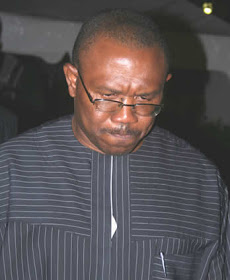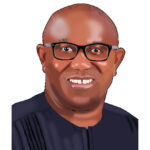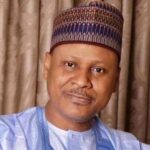Once again, we are having to reflect not only on a most egregious comment by a Nigerian politician characterising our last presidential election as a “religious war”, but on how the media has treated the comment as a newsworthy issue, and as an issue for fair comment.
Millions of Nigerian adults, and even children, would have heard by now the leaked audio of a telephone conversation between the Presidential candidate of the Labour Party and a former governor of Anambra State, Mr Peter Obi, and the founder of the Living Faith Church Worldwide, Bishop David Oyedepo, in which the former described the election as a “religious war” in a crude attempt to mobilise votes, and the latter agreed, saying “I believe that”, several times.
Yes, it matters for our politics and nation-building what Peter Obi said. It matters too that it was Peter Obi, a politician who wants to be president of such a huge and diverse country, and the supposed “new kid on the block” of Nigerian politics, as the Nobel Laureate Wole Soyinka described him, who said it. But quite frankly, I personally don’t care much what the man said. I care, very much, however, about the way and manner in which our media, particularly the mainstream newspapers and broadcast media, have reported it in both news and commentary.
Why is there no outrage in the press against Obi about his comment? Why, in fact, is there scarcely a whimper in the mainstream newspapers about it? Why, for the sake of Nigeria, has our airwaves and news pages been filled with defenders and excusers of Obi? Why are there no opinion columns pontificating about Nigeria’s secularism and descriptions of Obi as a religious bigot? Why have we not read or listened enough to comments accusing Obi of attempting to Christianize Nigeria, or worse even destabilise it?
These questions, relating more to media treatment of Obi’s comments, are, for Nigerian democracy and statehood, far more important than what Peter Obi said. Politicians are free to say whatever they want, but it is the supreme job of the media to hold them accountable for what they say, on the basis of certain principles, codified in our laws or conventions.
But to be fair to Obi, let us first disentangle the two levels of the whole leaked audio: the act of seeking votes along religious lines and the characterization of a presidential election in Nigeria as a religious war. In our politics, the two operate at different levels, and must be analyzed as such.
There is nothing exactly new about a politician, even a presidential candidate, exhorting a religious leader to help mobilise votes in their favour. Ordinary voters, campaign foot soldiers and candidates have always deployed religion or ethnicity as a political resource for mobilising votes during our elections.
Obi’s teary pleas to Oyedepo to help mobilise Christian votes in the South West and Kwara State are not too different, for example, from both Atiku and Tinubu’s campaigns seeking the explicit endorsement of Sheikh Dahiru Bauchi. Nor yet is it different from Atiku and Tinubu’s deployment of their ethnicity and regional affiliations via slogans like naka sai naka (your son is your son) and awalokan (it’s our turn), respectively, in the same election. The words and tactics may be different, but the objectives are the same.
Describing our presidential election as nothing but a religious war, however, is rather very extreme, and requires a different approach to analysing it. Even then, such extreme viewpoints of mischaracterising politics as a religious conflict of sorts are not also exactly new in Nigerian politics. It is not too far off, for example, from Buhari’s exhortation of Muslims to vote for those best to protect their interest, which was not too incorrectly interpreted in the press as is saying Muslims should vote only for Muslims, at the peak of the resulting crises over the adoption of Sharia by some states in the North, and just about two years before the presidential election of 2003.
It is certainly not much different from Buhari’s other comment near the 2011 election that the dog and the baboon would be soaked in blood if the election were rigged. Obi’s this election “is a religious war” comment is also certainly not too different from a sitting Vice-President Yemi Osinbajo saying in front of Christian clerics that his presidential ambition was a “manifest destiny” on behalf of the Church in a plural Nigeria.
All four cases are, to varying degrees, extreme versions of the same deployment of religion or religious metaphor for political purposes in our country, and in that regard, Obi is no more guilty than Buhari or Osinbajo.
However, while the act of playing politics with religion in various guises has always been rife in our political system, the Nigerian media has always claimed to frown on it and positioned itself as the champion of Nigerian secularism. Our newspapers and broadcast networks have always created the impression that any politician who seeks to lead Nigeria at the national or federal level cannot freely express certain views that pitch our diverse religious cultures and peoples against one another whatever their private beliefs, and rightly so.
It was, indeed, for this same claim of standing up for Nigerian secularism and not pitching our religions against each other that the Nigerian media fought against Sharia in this country. It was the reason why the media opposed Islamic banking, and why it opposed the use of Hausa-nized Arabic script on our currency, the naira, for years. It was for this reason, now so-called, that Buhari has been vilified in news and commentary in this country throughout his political career over the past 20 years.
Even now, many Nigerians who stand against Buhari in Nigerian politics don’t have any other reasons than that he “hates Christians”, an impression created largely by the media, and without as much direct evidence of the politicisation of religion as in the Peter Obi and Osinbajo cases.
It was for this reason, too, that the Minister of Communications and Digital Economy, Professor Isa Ali Pantami, was forced to apologise for comments he made 15 years ago when he was an Islamic preacher, comments that are not too different from saying the country is in a religious war. It didn’t matter when Pantami, the preacher said it 15 years ago, but as a federal minister in a plural Nigeria, it matters and he was made to account for it.
It is for the same reason that the Governor of Kaduna State, Malam Nasir El-Rufai, has lately been vilified in the press for “inciting religious conflict” in his state, whatever that means, and without any concrete evidence. It was for the same reason that Senator Ahmed Yarima was roundly criticised, for saying on the floor of the Senate, his religion does not permit saying a minimum age limit for marriage for girls. We can go on, and on.
But Peter Obi and Osinbajo, both vying for the highest national leadership, have gone scot-free in the same media for saying much the same things for which Buhari, Pantami, El-Rufai, Yarima, and the others, were held “accountable”. So, now, we can confidently say that the media has always been pretending about its own claims of standing for a secular Nigeria in order to hide its own dangerous Christian bias. Now we know.

 Join Daily Trust WhatsApp Community For Quick Access To News and Happenings Around You.
Join Daily Trust WhatsApp Community For Quick Access To News and Happenings Around You.


